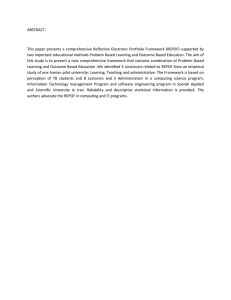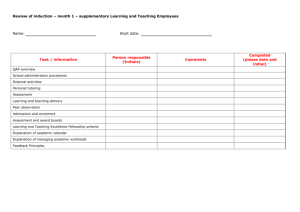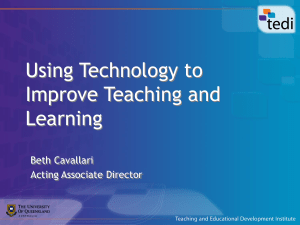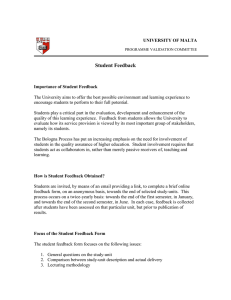CS3 Fall 2005 Lecture week 15
advertisement
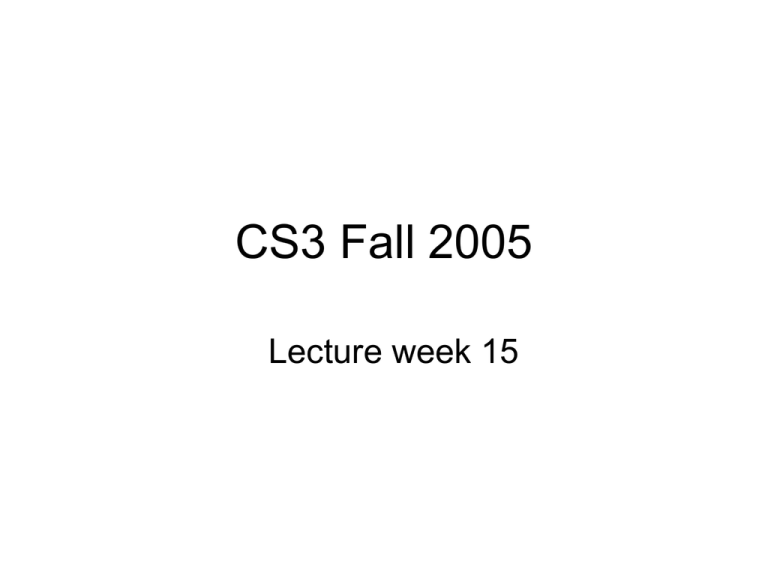
CS3 Fall 2005 Lecture week 15 Administrivia • The final survey will be up tomorrow: – you NEED to do this to receive a grade on your project! • Final: – Saturday, Dec 17th, 8-11 a.m. – 155 Dwinelle – Practice final in reader • Study help: – Final review session: Thursday, Dec. 15th, 8 pm – 11 pm. • Wozniak Room, 430 Soda Hall – Check the course portal announcements for additional office hours the week before the final. – Send questions to Bobak, James, or Nate. Nov 28 Dec 15 Lecture: What is CS at Berkeley? (guests) Lab: Big Project CHECKOFF #1 – Tue/Wed (beginning of lab) CHECKOFF #2 – Thur/Fri Lecture: Summary, other languages Lab: Finish up the Project CHECKOFF #3 – Tue/Wed Project Due on Thur/Fri Final Review Session, 8pm-11pm Dec 17 Final: 8am-11am, 155 Dwinelle Dec 5 The project • Checkoff #3 is the next lab. The TA will run your code. • Project is due at midnight on the day of your lab, this Thursday/Friday. • Any questions about anything? So, what have we done in CS3? • Consider the handout of topics – Common topics – Pre-recursion – Recursion – Higher order procedures – Lists – Case studies – Working with large programs Another list… 1. 2. 3. 4. 5. Functional programming Functions as data Recursion Abstraction Managing large programs Another list continued 1) Functional Programming – – – All that can matter to a procedure is what it returns. Small functions can be easily tested (isolated) In other languages, you typically: • • • – Perform several actions in a sequence Set the value of a global or local variable. Print, write files, draw pictures, connect to the internet, etc. Other "paradigms": sequential, object-oriented, declarative Another list continued 2) Functions as data – Higher order procedures will take functions as parameters. – It is useful to return functions – Lambda is quite useful Another list continued 3) Recursion – Linear (simple) to quite advanced – In contrast to iteration and looping (where counters or state define looping constraints) • Knowledge of recursion will help these simpler cases. Another list continued 4) Abstraction – The big idea that is related to everything! – A design practice that makes it possible to carve up a problem, and therefore focus on only part of it. • Makes working collaboratively more efficient Another list continued 5) Managing large programs – Style: commenting, naming conventions, etc. – Abstraction: for maintenance and collaboration – Iterative testing – Reading the specifications, and communicating often with colleagues How are you going to study for the Final? The language Scheme • Scheme allows you to ignore tedium and focus on core concepts – The core concepts are what we are teaching! • Other languages: – Generally imperative, sequential – Lots and lots of syntactic structure (built in commands) – Object-oriented is very "popular" now CS3 concepts out in the world • Scheme/lisp does show up: scripting languages inside applications (emacs, autocad, Flash, etc.) • Scheme/Lisp is used as a "prototyping" language – to quickly create working solutions for brainstorming, testing, to fine tune in other languages, etc. • Recursion isn't used directly (often), but recursive ideas show up everywhere Java and PHP • Java is a very popular programming language – Designed for LARGE programs – Very nice tools for development – Gobs of libraries (previous solutions) to help solve problems that you might want solved • PHP – Popular course for web development (combined with a web-server and database) – Lots of features, but little overall "sense" – Because programs in PHP execute behind a webserver and create, on the fly, programs in other languages, debugging can be onerous. SQL (structured query language for databases) resembles HOFs • query: “Tell me the names of all the lecturers who have been at UCB longer than I have.” select name from lecturers where date_of_hire < (select date_of_hire from lecturers where name = 'titteton'); • query: “Tell me the names of all the faculty who are older than the faculty member who has been here the longest.” select L1.name from lecturers as L1 where L1.age > (select L2.age from lecturers as L2 where L2.date_of_hire = (select min(date_of_hire) from lecturers) );

